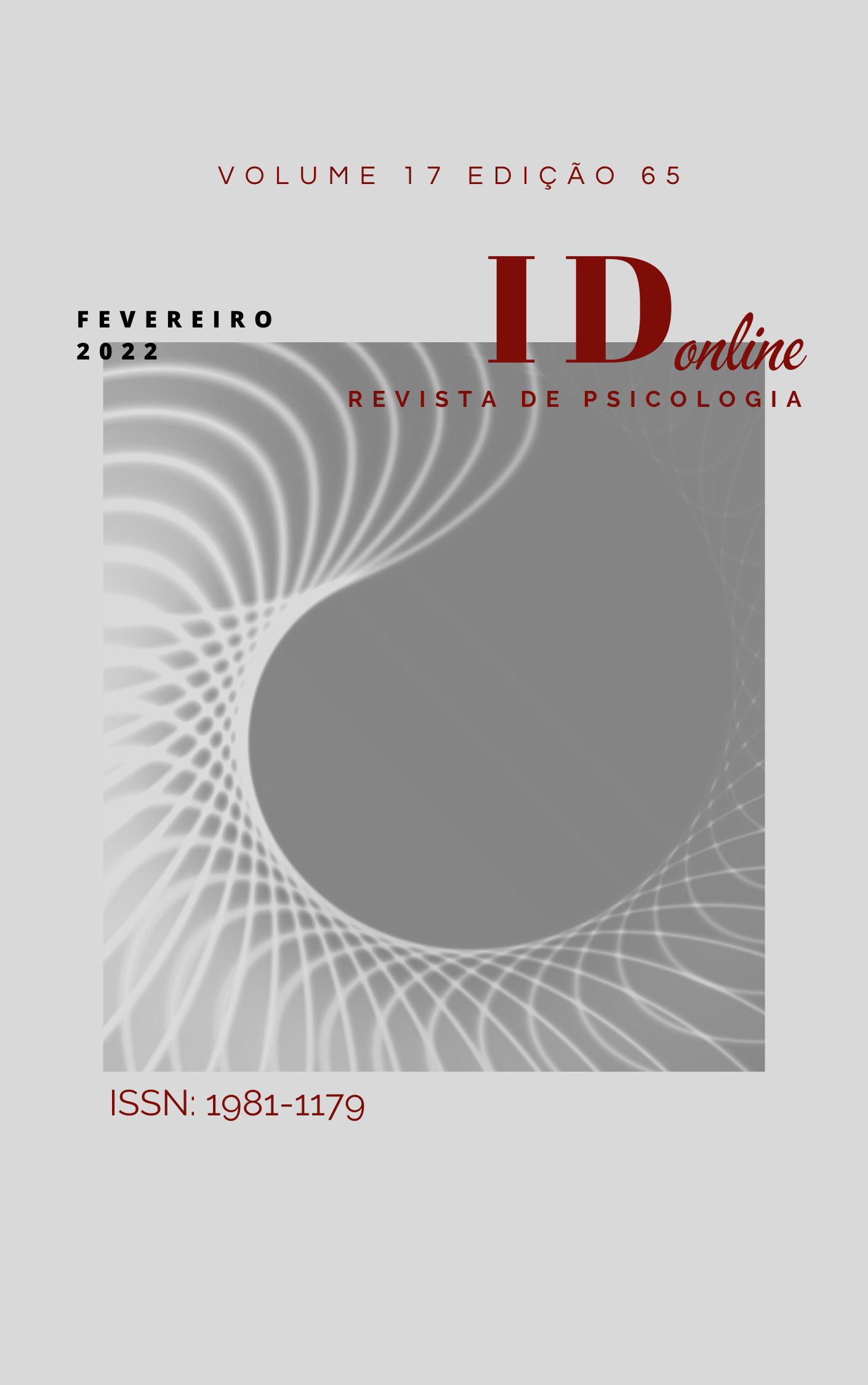Os Impactos da Cultura Organizacional na Saúde de Professores Universitários: Uma Revisão Integrativa
DOI:
https://doi.org/10.14295/idonline.v17i65.3696Palavras-chave:
Cultura Organizacional;, Saúde do Trabalhador, Professor UniversitarioResumo
As transformações no trabalho afetam a cultura organizacional de instituições de ensino superior, alterando a forma como os professores se relacionam com o mesmo e executam suas atividades, podendo gerar adoecimentos. O objetivo foi investigar possível relação entre cultura organizacional e saúde de professores universitários. Trata-se de uma revisão integrativa com busca de alta sensibilidade, utilizando os padrões do PRISMA, nas bases de dados PubMed, Cochrane, PsycNet e BVS. Foram incluídos artigos disponíveis na íntegra em português, espanhol e inglês e excluídos, resumos apresentados em congressos e trabalhos que não tivessem ligação com a temática. Foram utilizados os seguintes descritores do MeSH, referente às três primeiras bases: “Faculty”, “Organizational Culture”, “Occupational Health” e os descritores do DeCS, referente à última base: “Docentes”, “Cultura Organizacional” e “Saúde do Trabalhador”. Esses descritores foram combinados com seus sinônimos com o operador Booleano OR e entre as temáticas, o AND. Foram encontrados 700 estudos, sendo 36 duplicados excluídos inicialmente e posteriormente 647, a partir da leitura de título e resumo. Por fim, restaram 17 artigos que foram lidos na íntegra e, como nem todos se encaixavam na temática, apenas 6 artigos foram levados em consideração para o presente estudo. Os trabalhos apresentam forte relação entre cultura organizacional e saúde ocupacional, principalmente nos termos da vitalidade e do bem-estar. É possível ainda perceber que práticas e valores de orientação, iniciativa, apoio e relacionamentos positivos tem relação preditiva mais forte, enquanto que valores de competitividade e relacionamentos negativos geraram prejuízos na saúde dos professores.
Downloads
Referências
BORGES, L. O. de; YAMAMOTO, O. H. Mundo do Trabalho: construção histórica e desafios contemporâneos. In: ZANELLI, J. C., BORGES-ANDRADE, J. E., BASTOS, A. V. B. Psicologia, Organizações e Trabalho no Brasil, 2. ed, Porto Alegre, Artmed, 2014.
CARLOTTO, M. S., e CÂMARA, S. G. Análise da produção científica sobre a Síndrome de Burnout no Brasil. Psico, v. 39, 152- 158, 2008.
FASSIOTTO, M. et al. An Integrated Career Coaching and Time-Banking System Promoting Flexibility, Wellness, and Success: A Pilot Program at Stanford University School of Medicine. Academic Medicine, v. 93, n. 6, p. 881–887, 2018. DOI: https://doi.org/10.1097/ACM.0000000000002121
HOFSTEDE G., NEUIJEN, B., OHAVY, D. D., & SANDERS, G. Measuring organizational culture s: A qualitative and quantitative study across twenty cases. Administrative Science Quarterly, 35, 286-316, 1990. DOI: https://doi.org/10.2307/2393392
MENDONÇA, H. et al. Cultura organizacional, Coping e Bem-estar Subjetivo: Um estudo com professores de universidades brasileiras. Revista Psicologia, Organizações e Trabalho, v. 14, n. 2, Junho, 2014.
PEREIRA, H. P.; SANTOS, F. V.; MANENTI, M. A. Boletim de Conjuntura Energética. Revista UFRR, v. 2, p. 41–48, 2020.
POLOLI, L. et al. A study of the relational aspects of the culture of academic medicine. Academic Medicine, v. 84, n. 1, p. 106–114, 2009. DOI: https://doi.org/10.1097/ACM.0b013e3181900efc
POLOLI, L. H. et al. Faculty Vitality-Surviving the Challenges Facing Academic Health Centers: A National Survey of Medical Faculty. Academic Medicine, v. 90, n. 7, p. 930–936, 2015. DOI: https://doi.org/10.1097/ACM.0000000000000674
REGO, Arménio. Comprometimento organizacional e ausência psicológica: afinal, quantas dimensões?. Revista de administração de empresas, v. 43, n. 4, p. 25-35, 2003. DOI: https://doi.org/10.1590/S0034-75902003000400003
SANTOS, J. C. V.; VIZZOTTO, M. M.; GONÇALVES, G. Antecedentes do Bem-Estar no Trabalho: O Caso das Universidades Brasileiras. Psicólogo inFormação, v. 19, n. 19, p. 15–34, 2015. DOI: https://doi.org/10.15603/2176-0969/pi.v19n19p15-34
SCHEIN, E. H. Organizational culture and leadership, 2ª ed. San Francisco: Jossey-Bass, 1992.
SILVA, N., ZANELLI, J. C. e TOLFO, S. R. Cultura Organizacional. In: ZANELLI, J. C., BORGES-ANDRADE, J. E. e BASTOS, A. V. B. Psicologia, Organizações e Trabalho no Brasil, 2ª ed, Porto Alegre, Artmed, 2014.
SOUZA, G. C. DE. Cultura organizacional como elemento de controle: uma perspectiva antropológica. Revista Eletrônica de Ciência Administrativa, v. 6, n. 2, p. 1–14, 2007. DOI: https://doi.org/10.21529/RECADM.20070602003
SOUZA, M. T. DE; SILVA, M. D. DA; CARVALHO, R. DE. Revisão integrativa: o que é e como fazer. Einstein, v. 8, n. 1, 2010.
TOWNE, S. D. et al. Changing organizational culture: Using the CEO cancer gold standard policy initiatives to promote health and wellness at a school of public health. BMC Public Health, v. 15, n. 1, p. 1–8, 2015. DOI: https://doi.org/10.1186/s12889-015-2186-3
SIQUEIRA, M. M. M.; ORENGO, V. e PEIRÓ, J. M. Bem-estar no Trabalho. In: SIQUEIRA, M. M. M. Novas Medidas do Comportamento Organizacional: Ferramentas de diagnóstico e gestão, Porto Alegre, 2014.
Downloads
Publicado
Como Citar
Edição
Seção
Licença
Copyright (c) 2023 Luan Martins de Souza ; Rodrigo Jacob Moreira de Freitas

Este trabalho está licenciado sob uma licença Creative Commons Attribution-NonCommercial 4.0 International License.
Os autores detêm os direitos autorais sem restrições, devendo informar a publicação inicial nesta revista, em caso de nova publicação de algum trabalho.










